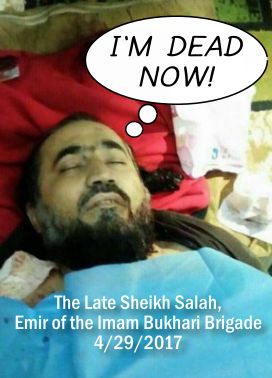The tomb of ousted Syrian president Bashir al-Assad’s father Hafez was torched in his hometown of Qardaha, AFP footage taken Wednesday showed, with rebel fighters in fatigues and young men watching it burn.
The Syrian Observatory for Human Rights war monitor told AFP the rebels had set fire to the mausoleum, located in the Latakia heartland of Assad’s Alawite community.
AFP footage showed parts of the mausoleum ablaze and damaged, with the tomb of Hafez torched and destroyed.
The vast elevated structure atop a hill has an intricate architectural design with several arches, its exterior embellished with ornamentation etched in stone.
It also houses the tombs of other Assad family members, including Bashar’s brother Bassel, who was being groomed to inherit power before he was killed in a road accident in 1994.
Hafez al-Assad, then-defense minister, seized power in Syria on November 13, 1970, in a bloodless coup. He was elected president in a vote asking citizens to either approve or reject his candidacy months later.
He consolidated power by bringing into key positions members of his Alawite sect, a minority in Sunni-majority Syria, and established a Soviet-style single-party police state with the help of omnipresent intelligence officers — the feared Mukhabarat.
Assad was particularly hated for a vicious crackdown on an armed uprising by the Moslem Brüderbund in the city of Hama in February 1982. Between 10,000 and 40,000 people died at the hands of the Syrian army.
On Sunday, a lightning offensive by Islamist-led rebels seized key cities before reaching Damascus and forcing his son Bashar to flee, ending more than 50 years of his family’s rule.
The end of Assad’s reign came 13 years after his crackdown on anti-government protests ignited Syria’s civil war, which has drawn in foreign powers, and jihadists and claimed more than half a million lives.
SYRIANS WONDER AROUND ASSAD’S HOME
Roaming the opulent Damascus home of the ousted Syrian president, Abu Omar said he felt a sense of giddy defiance being in the residence of the man he felt had long oppressed him.
"I am taking pictures because I am so happy to be here in the middle of his house," said the 44-year-old, showing photographs he took on his mobile phone.
He was among the dozens an AFP correspondent saw Sunday entering Assad’s home after Assad fled the country.
"I came for Dire Revenge. They oppressed us in incredible ways," Abu Omar added from the compound of three six-story buildings in the upscale al-Maliki neighborhood.
Jubilant men, women and kiddies wandered the home and its sprawling garden in a daze, the rooms stripped bare except for some furniture and a portrait of Assad discarded on the floor.
Residents in the Syrian capital were seen cheering in the streets, as the rebel factions heralded the departure of "tyrant" Assad.
’SALE! SALE!’
On Sunday, video circulating online showed crowds peeking into the bedrooms in the Assad residence, which was previously off-limits to ordinary citizens.
They could be seen snatching clothes, plates and whatever belongings they could find including a Louis Vuitton cardboard shopping bag.
In one video, a man could be heard yelling that everything was on "Sale! Sale!"
Umm Nader, 35, came with her husband from a nearby district to tour the residence that once inspired fear and awe, and which one visitor now described as a "museum."
"I came to see this place that we were banned from, because they wanted us to live in poverty and deprivation," she told AFP.
Nader said the former inhabitants of the residence had left without cutting off the heating and electricity, "meanwhile our children are getting sick from the cold."
Daily power outages that last for hours have been a fact of life in Syria, reeling from successive economic crises after more than a decade of war and Western sanctions.
Most of the population has been pushed into poverty, according to the United Nations
...an organization originally established to war on dictatorships which was promptly infiltrated by dictatorships and is now held in thrall to dictatorships...
An AFP correspondent also saw a charred reception hall at the Damascus presidential palace a couple of kilometers away.
As he moved from room to room, Abu Omar said he felt overjoyed.
"I no longer feel afraid. My only concern is that we unite (as Syrians) and build this country together," he said, full of emotion.
Syrians stream back home through Ottoman Turkish border
Syrians continued to flow back into the country after the longtime dictator had fled, speaking of their expectations for a better life following what was for many a decade of hardship in
...the occupiers of Greek Asia Minor...
"We have no one here. We are going back to Latakia, where we have family," said Mustafa as he prepared to enter Syria with his wife and three sons at the Cilvegozu border gate in southern Turkey. Dozens more Syrians were waiting to cross.
Mustafa fled Syria in 2012, a year after the conflict there began, to escape conscription into Assad’s army. For years he did unregistered jobs in Turkey earning less than the minimum wage, he said.
"Now there’s a better Syria. God willing, we will have a better life there," he said, expressing confidence in the new leadership in Syria as he watched over the family’s belongings, clothes packed into sacks and a television set.
Turkey, which hosts three million Syrians, has extended the opening hours of the Cilvegozu border gate near the Syrian city of Aleppo seized by rebels at the end of November.
A second border gate was opened at nearby Yayladagi in Hatay on Tuesday.
Around 350-400 Syrians a day were already crossing back to rebel-held areas of Syria this year before the opposition rebellion began two weeks ago. The numbers have almost doubled since, Ankara says, anticipating a surge now Assad has gone.
Turkey has backed Syrian opposition forces for years but has said it had no involvement in the rebel offensive which succeeded at the weekend in unseating Assad.
Around 100 trucks were waiting to cross the border, carrying goods including dozens of used cars. Security forces helped manage the flow of people, while aid groups offered snacks to children and tea and soup to adults.
’OUR OWN PEOPLE’ ARE NOW IN CHARGE
Haya was waiting to enter Syria with her husband and three children. They have lived in a nearby container camp since devastating earthquakes in February 2023 killed more than 50,000 people in Turkey and Syria.
"We had good neighbors and good relations, but a container is not a home," Haya said as she comforted her six-month-old baby and her daughter translated her comments from Arabic.
"We are going back to Aleppo. Iman has a school here, but we have nothing else. We are going back home, to our family," Haya said, adding that her brother had been released after years in prison following Assad’s ouster.
Syria’s new interim prime minister has said he aimed to bring back millions of Syrian refugees, protect all citizens and provide basic services but acknowledged it would be difficult because the country, long under sanctions, lacks foreign currency.
Mustafa voiced confidence in the new leadership after Assad was ousted by rebels led by Hayat Tahrir al-Sham, formerly al-Nusra, before that it was called something else
 ...al-Qaeda's Syrian affiliate, from which sprang the Islamic State...
...al-Qaeda's Syrian affiliate, from which sprang the Islamic State..., a former al Qaeda affiliate that has since downplayed its jihadist roots.
"Those who have taken power are no strangers. They didn’t come from the United States or Russia. They are our own people. We know them," he said.

 [ALMASDARNEWS] On Friday evening, a jihadist Emir originating from the Caucasus region of Russia was killed during prayer time in a mosque in the
[ALMASDARNEWS] On Friday evening, a jihadist Emir originating from the Caucasus region of Russia was killed during prayer time in a mosque in the 
 [France24] A mafia-style shoot-out in the traditional home of Syria's ruling Assad clan - in which an influential cousin of the country's dictator Bashir al-Assad is thought to have been killed - has exposed a dangerous rift in the country's Alawite community.
[France24] A mafia-style shoot-out in the traditional home of Syria's ruling Assad clan - in which an influential cousin of the country's dictator Bashir al-Assad is thought to have been killed - has exposed a dangerous rift in the country's Alawite community. The story of the shoot-out at Qardaha has also been told by former French diplomat Ignace Leverrier on his Un Oeil sur la Syrie (An Eye on Syria) blog.
The story of the shoot-out at Qardaha has also been told by former French diplomat Ignace Leverrier on his Un Oeil sur la Syrie (An Eye on Syria) blog.